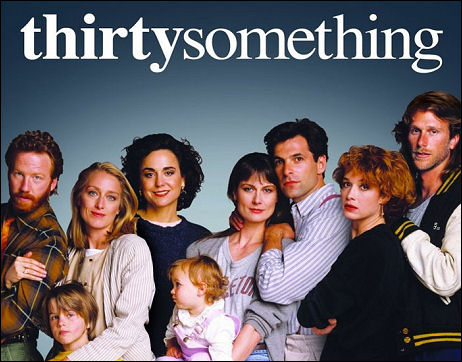I always felt that thirtysomething, the zeitgest-reflecting, essential-viewing yuppie series that ran from 9.87 through 5.91, was too sensitive-wimpy. As honestly written and impressively acted as it often was, the show suffered from an almost oppressive self-examination syndrome — a constant exercise in fault-finding and angst exploration — among its boomer characters and their difficulties in managing and/or growing into adulthood and parenthood. To varying degrees everyone on the show wore a hair shirt, suffered or caused suffering, and was afflicted (if not wracked) with self doubt.

(l. to r.) Timothy Busfield, Patricia Wettig, Polly Draper, Mel Harris, Ken Olin, Melanie Mayron, Peter Horton.
I forget who said “an unexamined life is not worth living” but thirtysomething sure as hell put the wisdom of that statement to the test. The women (Mel Harris, Melanie Mayron, Patricia Wettig, Polly Draper) were constantly fretting and kvetching over some crisis of the spirit, the bedroom, the bankbook or whatever. Always something darkening, taunting or haunting their brow.
And the guys especially (Ken Olin, Timothy Busfield, Peter Horton) — those poor Hebrew rock-pounders, bent and sweating under Pharoah’s lash! — were always being busted, picked apart and de-balled for this and that profound failing.
I hated Harris’s character, Hope (who played Olin’s wife), most of all. I remember being told by a cast member in ’88 that Hope was referred to by others on the show as “mope.” Everyone hated her. I’m certain she brought tens of thousands of watchers down every week. For all I know she may have inspired real-life fights, separations, divorces. (Or maybe people saw her personality as a cautionary tale and tried to be unlike her as much as possible.) Either way she was a huge drag to be around.
I related to what the show was, of course. I began watching just before getting married to my ex-wife Maggie in October 1987. and we both both became fairly devout fans (Maggie wore a gray “thirtysomething” t-shirt that I bought her) until the end of the run, during which time Jett came along in June 1988 and then Dylan in November 1989. It wasn’t a portrait of our marriage in every last respect, but there were certainly echoes.
And it happened during the bulk of our time together (we split up in the fall of ’91) so it became — in my head, at least — a kind-of running commentary on not just our life but all yuppie life in the late Ronald Reagan and George H.W. Bush years and yaddah-yaddah.
And that’s what we were, all right — 30ish yuppies with kids and two cars living a nice Los Angeles life. We lived in the top half of a house in the West Hollywood hills (with a great view) and then in a nice Spanish home in Venice. We did volunteer work for Michael Dukakis. We took our kids to Gymboree. We threw parties about twice a year, and often flew east to see the parents (or we hosted them in LA). In Venice we had a backyard jacuzzi, a brick patio and an ivy-covered privacy wall.
But — I need to say this again — I really didn’t care for the show’s guilt-trippy tone. It got so bad that I began to look forward to episodes with David Clennon‘s Miles Drentell, a close-to-blatantly-evil zen mindfucker who ran the successful Philadelphia ad agency that Olin and Busfield worked for. He was a truly rancid fellow, but at least he wasn’t depicted as getting henpecked and nagged to death all the time.
So if the show bothered me so much why did I keep watching for four years? Because I felt in the end that I needed the affirmation. It felt important (and maybe even a tiny bit flattering) to commune with a weekly nationwide psychiatric/group encounter session that was more or less about me and my kind. Watching it felt healthy on some level. It was almost like attending a kind of non-denominational church service or AA meeting.
And I always liked the opening-credits theme music (composed by W. G. Snuffy Walden), and hearing it really brings back those times. I would have them again.
Anyway, the show is finally being issued in a series of DVD box sets. The first season (1200 minutes) is making its appearance on Tuesday, 8.25.
Here‘s a N.Y. Times piece on the show (written by Ari Karpel) with quotes from its creators, Ed Zwick and Marshall Herskovitz, and some of its costars.
My favorite quote is from Mel Harris, to wit: “You learned very quickly that if you didn’t want a portion of your life to be broadcast to 30 million people, you didn’t share it with Ed and Marshall.”









